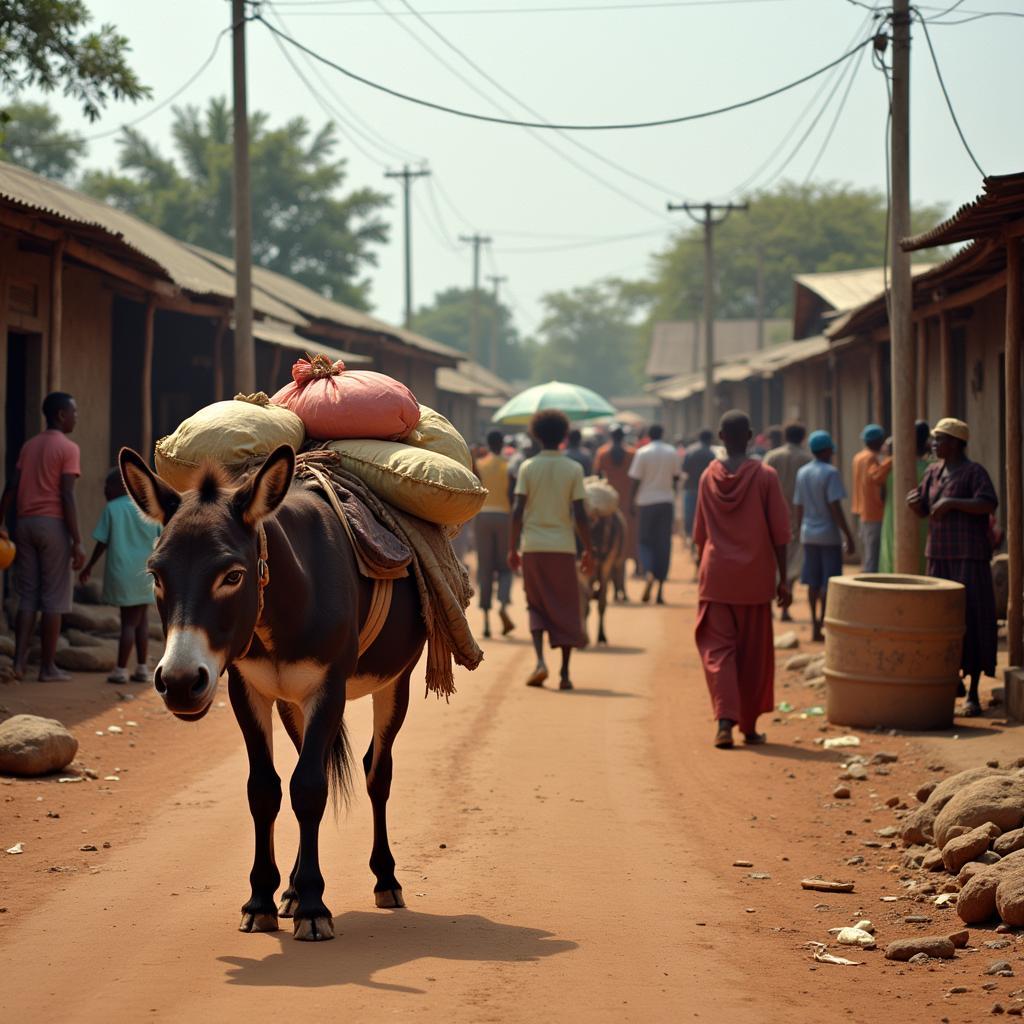Discovering the Diverse World of African Donkey Breeds
Donkeys play a vital role in the lives of many African communities, serving as essential partners in agriculture, transportation, and daily life. African Donkey Breeds, shaped by the continent’s diverse environments and human interactions, exhibit remarkable resilience and unique characteristics. Let’s delve into the fascinating world of these often-overlooked equines.
Uncovering the Unique Traits of African Donkey Breeds
African donkey breeds have adapted to thrive in a variety of climates, from arid deserts to humid coastal regions. This adaptability has resulted in a range of physical attributes and temperaments, making each breed uniquely suited to its environment and the needs of its human companions. Some breeds, like the Nubian donkey, are known for their impressive size and strength, while others, such as the Somali donkey, are prized for their endurance and agility. This diversity is a testament to the power of natural selection and the long history of human-donkey interaction in Africa. african domestic animals This symbiotic relationship has shaped the genetic makeup of these animals over centuries.
The Importance of Donkeys in African Culture and Economy
Donkeys are indispensable to the livelihoods of millions across Africa. They are the backbone of rural economies, carrying heavy loads across challenging terrain, transporting goods to markets, and helping with agricultural tasks. In many communities, donkeys are not merely beasts of burden but valued members of the family, playing important roles in social and cultural practices.
 African Donkey Breeds: Economic Impact
African Donkey Breeds: Economic Impact
Common African Donkey Breeds: A Closer Look
Across the vast expanse of Africa, various donkey breeds have evolved. Here are some of the most notable:
- The Nubian Donkey: Known for its large size and strength, this breed is often used for heavy work.
- The Somali Donkey: Characterized by its endurance and agility, it excels in traversing difficult terrains.
- The Masai Donkey: Highly valued for its hardiness and ability to thrive in challenging environments.
- The Miniature Mediterranean Donkey: Smaller in stature, this breed is often kept as a companion animal.
What are the different types of African donkeys?
There are numerous types of African donkeys, each with unique characteristics and adaptations to specific environments. They range from the larger, more robust breeds used for heavy labor to smaller, more agile breeds suited for navigating challenging terrain. This diversity showcases the remarkable adaptability of donkeys across the African continent.
african horse sickness prevention Understanding the nuances of each breed helps appreciate their essential role in African communities.
“Donkeys are incredibly resilient animals,” explains Dr. Anika Mohamud, a veterinarian specializing in equine health in Kenya. “Their ability to adapt to harsh climates and demanding workloads makes them invaluable partners for people across Africa.”
Conservation Efforts for African Donkey Breeds
The increasing demand for donkey hides in some parts of the world has led to concerns about the welfare and populations of certain African donkey breeds. african horse sickness 2019 Protecting these valuable animals is crucial, not only for their own sake but also for the communities that depend on them. Various organizations are working to promote sustainable donkey management practices and combat illegal trade.
“Conserving African donkey breeds is about more than just protecting animals; it’s about preserving a vital part of African culture and heritage,” says Dr. Mohamud. “These animals play a crucial role in the livelihoods of millions of people and their loss would have devastating consequences.”
African donkey breeds are a vital thread in the rich tapestry of African Life. Their diverse traits, remarkable resilience, and significant contributions to local economies and cultures make them invaluable assets. Understanding and appreciating these animals is crucial for ensuring their continued well-being and supporting the communities that depend on them.
FAQ
- What is the most common African donkey breed? The Nubian donkey is one of the most commonly recognized breeds due to its size.
- Are African donkeys endangered? While some breeds face threats due to illegal trade and habitat loss, not all African donkey breeds are currently classified as endangered.
- How are African donkeys used in agriculture? Donkeys are used for plowing fields, transporting crops, and carrying water, among other tasks.
- What are the challenges facing African donkey populations? Illegal trade, habitat loss, and disease outbreaks are some of the significant challenges.
- How can I support donkey conservation efforts in Africa? Donating to reputable organizations working in donkey welfare and sustainable management is one way to help.
- What is the average lifespan of an African donkey? African donkeys can live for 25-30 years or more with proper care.
- What is the difference between a donkey and a mule? A mule is the offspring of a male donkey (jack) and a female horse (mare). african horse fever swelling of the supraorbital fossa african equine crossword
When you need assistance, please contact us at Phone: +255768904061, Email: kaka.mag@gmail.com, or visit us at Mbarali DC Mawindi, Kangaga, Tanzania. Our customer support team is available 24/7.
